Liner notes on a lacunic genre fiction, initiated this Summer Procjam.
Mere Juxtaposition
Consider the narrative coloring of an illustration by its adjacencies. Allow those gaps which expand this space of interpretation.
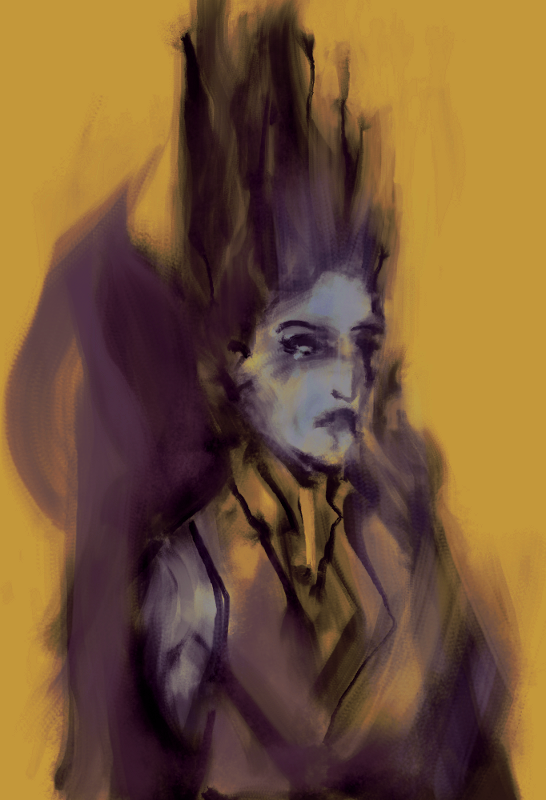
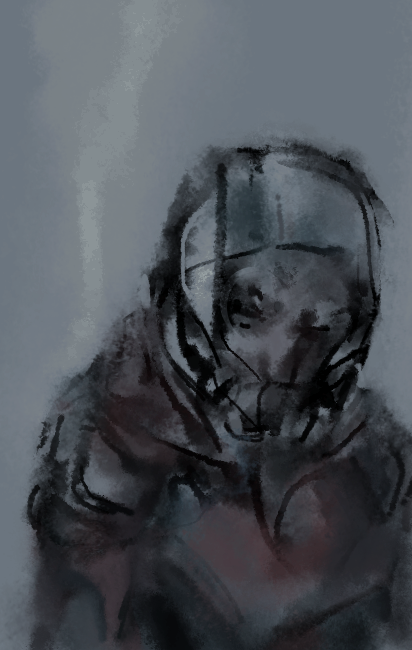
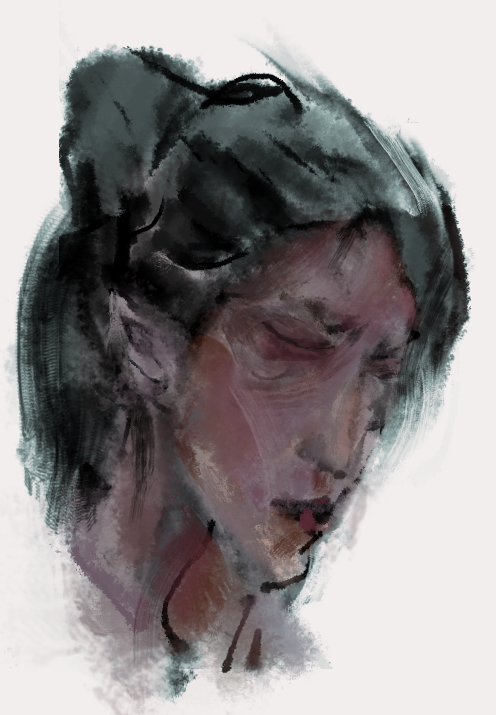
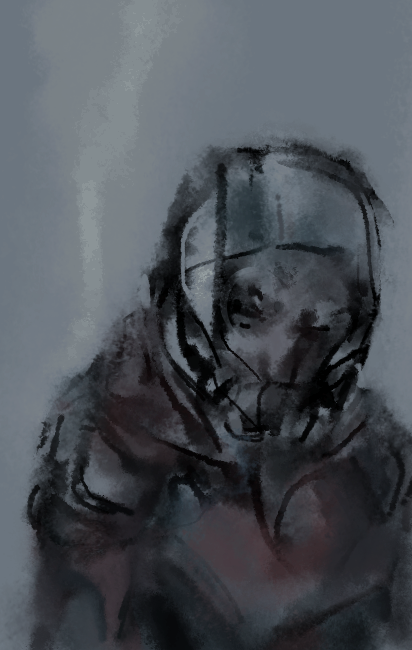
There is plot already. The reader authors it without conscious effort.
We would extend this technique, derived by designers from the Kuleshov montage. Leaning on mythology lets this demo be concise, but setting-knowledge in general is expensive.
Establishing a social network (a group of people reifying their images of each other) tends to require a thousand words. Since these are useful philosophical trials - er, fill in your favorite utility of the novel - nonetheless, our approach is a demake into text.
'Exul Mater' is a proof of approach, in the form of a fanfiction. (Er, 'myth-making practice'.)
Excerpt
> ...now that you have rank. How did you gain that?
> By denying the enemy their agent, at the same time faking your own death.
> She fell from the sky like a star. Shouldn't have let you on the transport shuttle, to be fair.
Let's examine the tempering effect of The High Priestess (aligned w/ winter, the harsh aspect of proving) compared with Judgement (aligned w/ moth, the fitful aspect of unknowing).
Knock
> "You know, savages aren't meant to be carved from marble." Her hand slips quickly from your too-heated grasp. She'd pass for Imperial - not that all citizens are pale.
> "Did they tell you our hearts were cold, devoid of human feeling?" Idyll doesn't even blame you. "That if we created, it was only for practical purpose? I am sorry."
Grail
> As the world is divided into evening and dawn, so we gave the wandering star two names, and it became divided. They will know you by your faces, which are your kith and kin, as you are theirs in turn.
Knock/Winter/Grail
> The master of a particular Remnant engine, who revealed the ruin inside a city, had sacrificed only the distinction between persons and resources. Therefore his assertion, his sum of efforts, was only the existence of naked power - which pond scum also prove.
> The white phosphorus reminds Meletus of their failed apprentice. The Huntress taught you to handle the the devil's element because of its use in smoke grenades, not for its effect as an incendiary. Oh well.
> You speak to me in riddles, tight knots of self-recrimination. You fear, or hope, absent lovers' regrets will turn to blame.
> You turn from me, and drape the curtains' embrace across your shoulders. You cannot take mine, or break the illusion.
> You are like your mother more than you know. You insist upon your judgement.
> The High King's eldest apprentice, your mother's lover, fell in the wake of the coup. He'd taken to regret too well, perhaps. He burned with abhorent martyrdom.
> His crimes were not treacherous, compared against hers. His redemption should have been the High King's curse broken. So what if he would not be cold? He should have burnt himself numb.
> One foot in the Order, which could not see itself hollow, and one foot out, where its strain could not be exploited.
> Soon the actual will match the shattered image.
Rahel uses Idyll for access to Caelum, and her throne.
Knock/Moth/Grail
> When she made us shatter(ed by) the collapsing planet, a deep well in physical spacetime, our general knew then that to remain present, sensate, would be to die or be destroyed.
> Traitor our marshal who broke her own master upon her duty, Betrayed and Betrayer who brought our general back to slaughter her own academy.
> You memorized your mother's weaknesses while young.
> You speak to me in riddles, tight knots of self-recrimination. You fear, or hope, absent lovers' regrets will turn to blame.
> You turn from me, and drape the curtains' embrace across your shoulders. You cannot take mine, or break the illusion.
> You speak of the woman you loved, the woman you destroyed. Did you join her on the tower steps? Do you regret what she became?
> "We must be ashamed to malinger, upon the same old battle lines." Her husband did say this much to me. Does your cohort enjoy their limited grasp of history? You may forget so many useless details, and never reify them again.
> ASK YOUR father whom he could not keep you safe from, that HE BEGGED for you to be made civilized and civilizer. I think he understood this goal.
> "Seeking ourselves, we'd be as killers, or healers, Rahel! Which role should I have led, so you'd need not?"
> But her child lies beneath Idyll's tree whose roots are cables, whose boughs are dendrites.
Watch the 'riddles' scene. It is a turning point for whether Rahel accepts her own cruelty; as a weakness of her kind, or as a horror of her civilization.
In turn, the enemy (avatar?) of her kind is her Order, as the agent (dupe?) of her civilization is her mother. Traffic between collectives and instances is tricky, and identity just goes and negotiates it.
Production
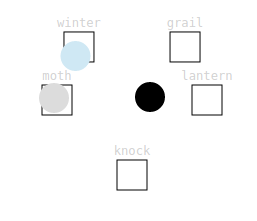
Parrigues Alignments
Calvino's Memos also introduce these desiderata, except for Mushroom's uniquely algorithmic character.
Salt (exactitude)
Scenes correspond to the 28 possible pairs (8 times 7, divided by 2) of 8 tokens. In practice I wrote 23, since by banning 3 tokens per 'context', we can control productions (out of 5 slots) much more easily.
Contexts are variants of world-state, and they gate over-repetition of scenes. For our anchor: professionalism and infatuation and guilt, neatly juxtaposed.
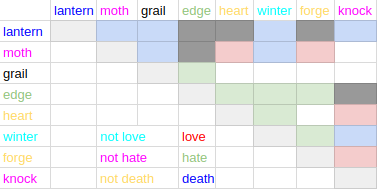
Beeswax (multiplicity)
A human generates all natural language content, and enough world state to indicate 'saddle points' where scenes should go (the fun bit). Other methods of annotating the relationship-graph and other features of world-state are much slower.
Especially illustration. But a lot of set-dressing is under-specified.
Egg (lightness)
To reveal secrets / images one or two at a time (as units of character), we prefer each scene within drabble-length (< 100 words). Prose of shorter length exerts greater juxtapositional force, and this is long enough to be complicated.
Scenes may be altered by the third token, occasionally. This is useful to texture a secret - or conceal stray detail, if any.
Venom (visibility)
Referring to character, a conceit for audience investment. The mere co-existence of tropes in one well-motivated being is interesting, but also essentially a proof of work - irreducible.
Mushroom (proliferation)
Most visible in plot, a useful lie to reveal the characters' relations. The audience is complicit because causality is always ascribed, and only physical in the empirical sense, which requires reproducibility. Social graphs, even outside of heightened narratives, are full of edge cases.
The 'rearrange' slider: Why is the order of scenes wobbly? To show it doesn't matter, entirely.
Tokens
With established proper nouns (including the narrator!), even trivial sentences may take on special significance. This will help us land the endings.
Proper nouns point to characters: human individuals, organizations, other emergent phenomena, & even useful tools.
Multiple explanations of the same person ('facets') are created by multiple readings, their traversal of roles. Our fragmented rendering promotes these.
Scenes
Take pairs of tokens. Now we have some raw matter to spin into scenes. Do not work from a single word, but a single image is appropriate.
Every relationship between characters has a tone, many of which are expressed succintly in songs. Use songs to prototype scenes! Use them to find verbs.
Do not associate songs to tokens. If you can't write out a sentence, it's not yet concrete. If you can, put it in your scene. It's hard to experience power if you don't smash anything, and other feelings need similar reification.
Delta closure
Once there's material to work, we can exploit the nature of edges (pairings) to find saddle points.
Given five slots, the first two tokens determine a scene $x$. The third token will choose one of three pairs of alternatives, all of which must agree with $x$.
The in-browser ritual (like a set of index cards) reveals this information during writing. I've put a template up.
More on 'triangle closures' is forthcoming once I've written more of them. It is useful to block in a few endings early on: the richness of prompts partly arises from accounting for their changes.
Endings
These were calculated by an assignment of points to each aspect, taking whichever kind(s) of point predominate. Since Exul Mater has three 'factions', each token gives points of loyalty toward one or two of them.
A 'loyal' ending results in an appropriate confrontation, one way or another. Split loyalties are feasible, e.g. resulting in multiple destroyed enemies.
Ending texts are an excellent chance to incorporate themes you've discovered that won't all fit in the title. They're also absurdly concise - otherwise, they overwhelm the scenes, - so you'll need the material.